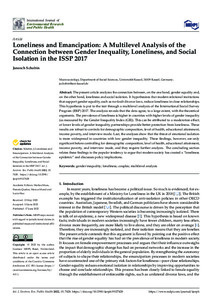Datum
2022-06-17Autor
Schobin, JanoschSchlagwort
300 Sozialwissenschaften, Soziologie ISSPGeschlechterforschungIsolation <Soziologie>EmanzipationSozialer IndikatorGleichbehandlungSozialpolitikPolitische UnterstützungPaarMetadata
Zur Langanzeige
Aufsatz

Loneliness and Emancipation: A Multilevel Analysis of the Connection between Gender Inequality, Loneliness, and Social Isolation in the ISSP 2017
Zusammenfassung
The present article analyzes the connection between, on the one hand, gender equality and, on the other hand, loneliness and social isolation. It hypothesizes that modern relational institutions that support gender equality, such as no-fault divorce laws, reduce loneliness in close relationships. This hypothesis is put to the test through a multilevel analysis of the International Social Survey Program (ISSP) 2017. The analysis reveals that the data agree, to a large extent, with the theoretical arguments. The prevalence of loneliness is higher in countries with higher levels of gender inequality (as measured by the Gender Inequality Index (GII)). This can be attributed to a moderation effect; at lower levels of gender inequality, partnerships provide better protection from loneliness. These results are robust to controls for demographic composition, level of health, educational attainment, income poverty, and interview mode. Last, the analyses show that the threat of emotional isolation is more widespread in countries with low gender inequality.
These findings, however, are only significant before controlling for demographic composition, level of health, educational attainment, income poverty, and interview mode, and they require further analysis. The concluding section relates these findings to the popular tendency to argue that modern society has created a “loneliness epidemic” and discusses policy implications.
These findings, however, are only significant before controlling for demographic composition, level of health, educational attainment, income poverty, and interview mode, and they require further analysis. The concluding section relates these findings to the popular tendency to argue that modern society has created a “loneliness epidemic” and discusses policy implications.
Zitierform
In: International Journal of Environmental Research and Public Health Volume 19 / Issue 12 (2022-06-17) eissn:1660-4601Förderhinweis
Gefördert durch den Publikationsfonds der Universität KasselZitieren
@article{doi:10.17170/kobra-202208266762,
author={Schobin, Janosch},
title={Loneliness and Emancipation: A Multilevel Analysis of the Connection between Gender Inequality, Loneliness, and Social Isolation in the ISSP 2017},
journal={International Journal of Environmental Research and Public Health},
year={2022}
}
0500 Oax
0501 Text $btxt$2rdacontent
0502 Computermedien $bc$2rdacarrier
1100 2022$n2022
1500 1/eng
2050 ##0##http://hdl.handle.net/123456789/14103
3000 Schobin, Janosch
4000 Loneliness and Emancipation: A Multilevel Analysis of the Connection between Gender Inequality, Loneliness, and Social Isolation in the ISSP 2017 / Schobin, Janosch
4030
4060 Online-Ressource
4085 ##0##=u http://nbn-resolving.de/http://hdl.handle.net/123456789/14103=x R
4204 \$dAufsatz
4170
5550 {{ISSP}}
5550 {{Geschlechterforschung}}
5550 {{Isolation <Soziologie>}}
5550 {{Emanzipation}}
5550 {{Sozialer Indikator}}
5550 {{Gleichbehandlung}}
5550 {{Sozialpolitik}}
5550 {{Politische Unterstützung}}
5550 {{Paar}}
7136 ##0##http://hdl.handle.net/123456789/14103
<resource xsi:schemaLocation="http://datacite.org/schema/kernel-2.2 http://schema.datacite.org/meta/kernel-2.2/metadata.xsd"> 2022-08-26T08:20:00Z 2022-08-26T08:20:00Z 2022-06-17 doi:10.17170/kobra-202208266762 http://hdl.handle.net/123456789/14103 Gefördert durch den Publikationsfonds der Universität Kassel eng Namensnennung 4.0 International http://creativecommons.org/licenses/by/4.0/ gender inequality loneliness couples multilevel analysis 300 Loneliness and Emancipation: A Multilevel Analysis of the Connection between Gender Inequality, Loneliness, and Social Isolation in the ISSP 2017 Aufsatz The present article analyzes the connection between, on the one hand, gender equality and, on the other hand, loneliness and social isolation. It hypothesizes that modern relational institutions that support gender equality, such as no-fault divorce laws, reduce loneliness in close relationships. This hypothesis is put to the test through a multilevel analysis of the International Social Survey Program (ISSP) 2017. The analysis reveals that the data agree, to a large extent, with the theoretical arguments. The prevalence of loneliness is higher in countries with higher levels of gender inequality (as measured by the Gender Inequality Index (GII)). This can be attributed to a moderation effect; at lower levels of gender inequality, partnerships provide better protection from loneliness. These results are robust to controls for demographic composition, level of health, educational attainment, income poverty, and interview mode. Last, the analyses show that the threat of emotional isolation is more widespread in countries with low gender inequality. These findings, however, are only significant before controlling for demographic composition, level of health, educational attainment, income poverty, and interview mode, and they require further analysis. The concluding section relates these findings to the popular tendency to argue that modern society has created a “loneliness epidemic” and discusses policy implications. open access Schobin, Janosch doi:10.3390/ijerph19127428 ISSP Geschlechterforschung Isolation <Soziologie> Emanzipation Sozialer Indikator Gleichbehandlung Sozialpolitik Politische Unterstützung Paar publishedVersion eissn:1660-4601 Issue 12 International Journal of Environmental Research and Public Health Volume 19 false 7428 </resource>
Die folgenden Lizenzbestimmungen sind mit dieser Ressource verbunden:


